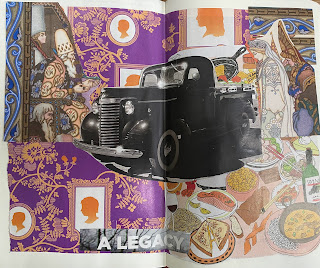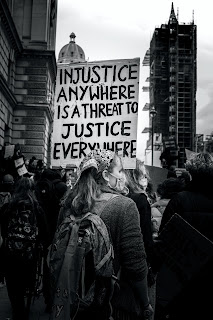Day 83 and 84 – Helen Keller, Disability advocacy, and the dominant narrative
Day 83 and 84 – Helen Keller, Disability advocacy, and the dominant narrative
I don’t know how old I was the first time I saw the 1962 movie “The miracle worker.” I only remember my imagination being completely captured by both Anne Sullivan and Helen Keller. Anne Sullivan has always been the person I “wanted to become.” As I’ve been thinking about how to weave context into my new writing about a critical approach to expressive arts therapy, I have been thinking about the things that capture my imagination – the early and enduring images I carry with me. And the image of Patty Duke, as Helen Keller, making the connection between the fingerspelling of w-a-t-e-r, and water is one of those images. I think that as a young child I had found some magic in learning and in the idea of being seen and cared for in the way that Anne Sullivan was portrayed as caring for Helen. I think I felt I was often closed off in my own world and waiting for someone to search me out. I certainly felt that reading, books, and the word offered me this freedom and containment.
As I researched this movie scene and its significance, I was interested to read that some children saw the movie in grade school, and that Helen Keller had been held out as a kind of “exemplar” as someone who could by the sheer will of their personality and drive pull themselves out of a disadvantaged position. This story rarely tells the whole story and rarely places the person in the relative position of privilege that they have – Helen as a white woman of means certainly met certain criteria to be a poster child for disabilities in the US during her lifetime. But the Time magazine article “Co-Founding the ACLU, Fighting for Labor Rights and Other Helen Keller Accomplishments Students Don't Learn in School” written by Olivia Waxman in Dec 2020, with the accompanying video by Arpita Aneja – tells the story of Keller’s activism, and “forgotten radicalism” to quote another article from a 2015 Time magazine article.
Not only did Keller co-found the ACLU, but she was also a suffragette, member of the Socialist Party, an early supporter of the NAACP who spoke out against lynching, and an early proponent of birth control. She has also been criticized for her early writing citing the eugenics movement someone not seen as entirely justified as an exemplar of disability justice.
I did find another extensive resource on learning about and teaching about the life of Helen Keller – the American Masters’ presentation of “Becoming Helen Keller” by PBS. I was impressed with the way the series deals with several of the key controversies in her life, and of the radical stance she took throughout her life using her platform to tackle controversial topics, and particularly to advocate for those less fortunate than herself. The American Masters’ series is particularly set up as an educational resource and has vocabulary, handouts, and discussion questions. Really quite interesting!
Again, one of the biggest take-aways for me was that “who” presents the story really shapes “how” the story is told and perceived!




Comments